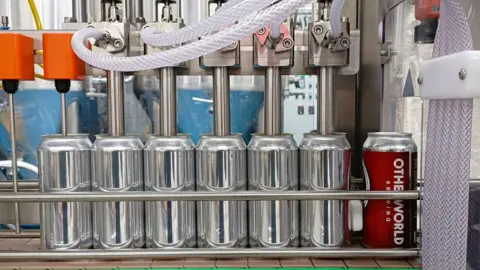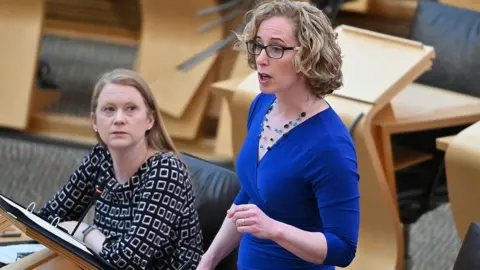Humza Yousaf accuses UK government of deposit return scheme sabotage
First Minister Humza Yousaf has accused the UK government of sabotaging a pilot recycling scheme by excluding glass.
Glass bottles were a key part of Scottish proposals for the deposit return scheme (DRS), due to start in March - ahead of other UK schemes.
The UK government agreed for the scheme to go ahead in Scotland, but said it wanted to ensure it "aligned" with plans in other nations.
The move casts doubt over whether the Scottish scheme can go ahead.
Mr Yousaf told the BBC: "They're not just trying to scupper the DRS - they're trying to undermine devolution. We've seen it multiple times.
"Not only is it bad in terms of devolution and self government, it's really poor for the environment. If we don't include glass that's 600 million bottles that won't be moved from our streets, our beaches and our parks."
 OtherWorld
OtherWorldBBC Scotland's political editor Glenn Campbell said one source closely involved in the DRS had put the chances of it going ahead at 50/50.
The Scottish government is expected to take a couple of weeks to crunch the numbers before making a decision.
The scheme is aimed at increasing the number of single-use drinks bottles and cans that are recycled.
It means 20p will be added to the price of a single-use drinks container, which will be refunded to people who return it to a retailer or hospitality premises that offer single-use products.
The scheme was due to begin in August but was delayed following concerns from the drinks industry.
Some firms feared it would place extra costs and other burdens on them at a time when they are already struggling.
Similar UK initiatives are expected in 2025 - with proposals in Wales including glass bottles.
Because Scottish ministers wanted to introduce their scheme sooner, they had to seek an exemption from the Internal Market Act.
The legislation was brought in after Brexit in a bid to ensure smooth trade across the different nations of the UK.
There had been concerns that the timing of a Scottish scheme could create a trade barrier.
'Same rules as UK'
On Saturday morning the UK government confirmed it had accepted the Scottish government's request "on a temporary and limited basis".
The exemption from internal market rules lasts from the launch of the Scottish scheme until other planned schemes are in place in the rest of the UK.
Scotland's DRS will cover PET plastic, aluminium, and steel cans only.
A UK government spokesperson said: "Deposit return schemes need to be consistent across the UK and this is the best way to provide a simple and effective system.
"A system with the same rules for the whole UK will increase recycling collection rates and reduce litter - as well as minimise disruption to the drinks industry and ensure simplicity for consumers."
Mr Yousaf previously claimed it would be a "democratic outrage" for the UK government to agree to the DRS excluding glass.
However Scottish Conservative MSP Maurice Golden said the situation was a mess of the Scottish government's own making.
He said: "Rather than trying to pick a fight, the SNP and Greens must now accept this help to create a deposit return scheme that actually works for the people of Scotland."
 Getty Images
Getty ImagesScottish Greens co-leader Lorna Slater, who had been driving the introduction of the DRS, said the Scottish Parliament had been "treated with contempt".
The decision to exclude glass meant she would have to look "very seriously" at the viability of the Scottish scheme, she said.
Mr Yousaf added that millions of pounds had been spent on a scheme that proposed to include glass.
He said he did not want to go ahead with a scheme that excluded glass, but would look at the various options.


For it to work effectively, the Scottish deposit return scheme needs an exemption from the rules of the UK internal market act.
The Scottish government has asked for that and - on the face of it - their request has now been granted by the UK government. So what's the problem?
There are strings attached. A tangle of conditions including the exclusion of glass that make the Scottish government wonder whether their proposals are still viable.
UK ministers will argue they are acting on a practical basis, to ensure any Scottish scheme aligns with future developments in other parts of the UK.
There are certainly businesses that welcome their intervention and others that may have an axe to grind against government at some level, having shelled out to prepare for a scheme that would include glass.
To Scottish ministers this is a power play by the UK government - an outrageous interference in devolved decision making akin to the block on gender reform legislation and resistance to indyref2.

The British Soft Drinks Association (BSDA) has said the "only viable option now" was for a UK-wide initiative to be launched across all four nations in 2025.
Dougal Sharp, founder of brewer Innis and Gunn, said uncertainty over the scheme made things "brutal and impossible to plan".

He said: "Businesses are already spending a lot of money on this scheme in Scotland. It just feels like another twist and a very shambolic scheme implementation.
"We've already seen it delayed from August. All of these delays inevitably lead to weakened consumer confidence and particularly business confidence.
"Businesses cannot plan in this environment. Businesses are struggling to survive and this is absolutely the last thing we need at the moment."
